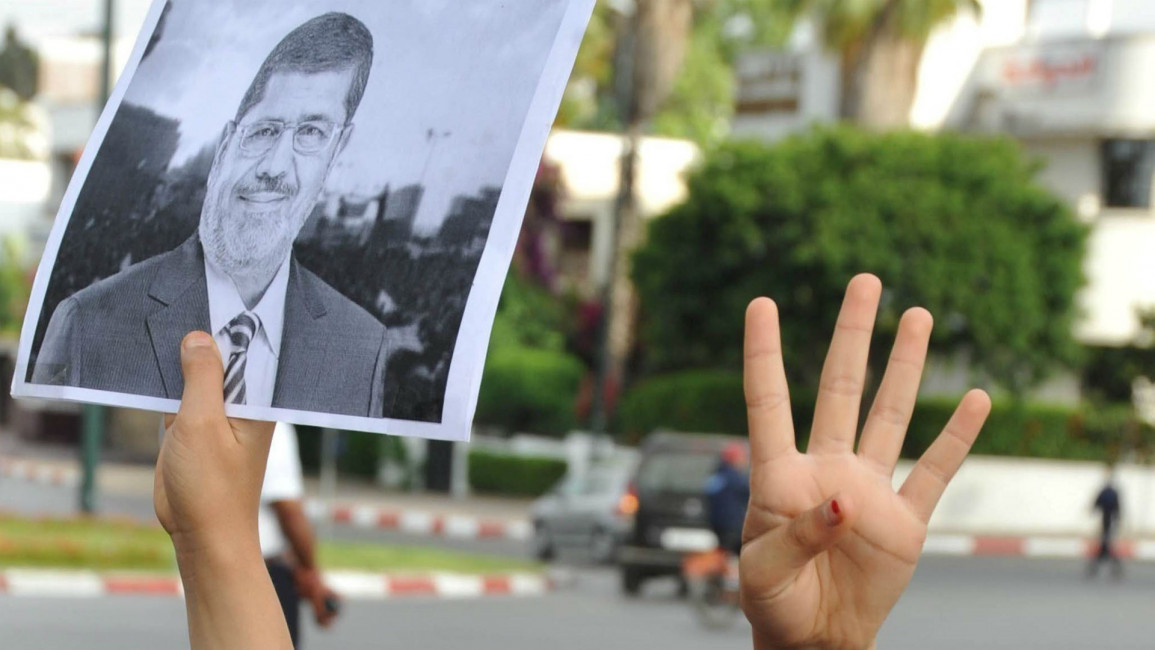
Morsi's sacrifice and the price of democracy
In his final speech as the democratically elected president of Egypt before the 3 July coup, Mohamed Morsi stated clearly he would sacrifice his life to protect the revolution and the legitimacy of Egypt's budding democracy.
It looks as though he might have to make that sacrifice.
A judicial tool
Egypt's judiciary, now informally referred to as the "murder machine" due to its tendency to hand out mass death sentences against political opponents, sentenced Morsi and 100 other Egyptians to death after they were found guilty of charges relating to a prison break and "espionage".
As with all other instances of these mass death sentences, the actual basis for the charges are widely considered to be absurd, and due process in the trial is characteristically farcical - five Palestinians sentenced to death were already dead when their alleged crimes were carried out.
| Five Palestinians sentenced to death along with Morsi were already dead when their alleged crimes were carried out. |
Attempting to find a reason for the behaviour of the Egyptian judiciary in the era of President Abdel Fatah el-Sisi is a pitiless task.
The only obvious motivation discernible in the incompetent and brutally reckless manner in which the Egyptian state has conducted its grim business is that every conviction and sentence handed out has been politically motivated.
Whether it is pro-democracy protesters or the democratically elected president of the republic that find themselves condemned, the mass death sentences are part of a wider campaign to eliminate political opposition to Sisi and the military's tyrannical rule.
The day after Morsi's sentencing, the regime hanged six men for allegedly carrying out attacks on military targets in early 2014 on behalf of an armed organisation loyal to the Islamic State group.
The charges and trial surrounding these executions would be farcical, if it weren't for the fact that six people ended up dead.
Three of the six were reportedly already in prison at the time the attacks occurred, while Amnesty International reported that the trial was "grossly unfair" and pointed to the fact that the only witness against the defendants was an undercover police officer.
The charges against Morsi indicate how the regime wishes to portray him, and how a significant majority of the country see him, his supporters and, most importantly, the period of democracy that followed the 25 January revolution.
Morsi faces the gallows on two separate charges. The first is for allegedly orchestrating a prison break during the 25 January revolution, while the second is on charges of espionage with Hamas and Qatar.
The first charge bears no resemblance to the reality of the events that surrounded Morsi's escape from prison on 28 January 2011. The very fact he was in prison was because of the Mubarak regime's authoritarian crackdown on political opponents at the beginning of the 25 January revolution, days earlier.
He only managed to escape because the security forces fled the prison as the revolution unfolded.
The second charge is the ace in the regime's deck: Morsi, the Muslim Brotherhood, its political wing the Freedom and Justice Party (FJP) - and their supporters - are all foreign criminals intent on destroying Egypt.
| Morsi only managed to escape because the security forces fled the prison as the revolution unfolded |
This is the essential narrative that has been used to justify everything from the massacres of pro-democracy protesters in Rabaa and Nahda squares to the mass death sentences.
The regime wants Egyptians to believe all who oppose Sisi are part of a foreign conspiracy to destroy or degrade Egypt in some dubiously abstract way - according to this narrative, Morsi was not a democratically elected leader but a theocratic agent of Qatar, conspiring with Hamas against every patriotic Egyptian.
The regime wants Egyptians to think democracy and its freedoms mean insecurity, instability and the infiltration of Egypt by foreign and alien forces and ideas, against which the only bulwark is Abdel Fatah al-Sisi, the Egyptian military and the status quo.
A regime dangerously out of touch
Forget the absolute poverty in which millions of Egyptians live, as the elites grow richer and bolder in pilfering the country, or the fact that their fellow Egyptians are murdered, tortured and raped en masse. All of this is necessary to defend Egypt from a democratic counter-revolution.
Those who still bother to follow events in Egypt from afar might imagine this narrative is triumphant. You can hardly blame them. Many believe aspects of this narrative about Morsi and, while they might condemn the oppression, they tacitly accept that he and his supporters somehow deserve it.
This is because those who actually face such repression, those who risk and sacrifice their lives on a daily basis by organising against Sisi in favour of democracy, have been sidelined for the crime of not being the right kind of Egyptians; for not being part of the marginal but over-represented clique of elite liberals and leftists who protested against Mubarak but then joined the anti-Morsi counter-revolution.
People can disregard them, dismissing them as "Islamist", or "the Brotherhood", with all the negative connotations that this conjures up in the West and around the world. The sinister logic is that when they are murdered and tortured it's unpleasant - but then "Islamists" are not very pleasant themselves, as we all know.
Whether or not the regime goes through with the execution of Morsi, the fact is that what he represented, in all its perceived moderation, still lives on in the minds of those Egyptians who have remained active in the face of such merciless repression from the state.
Normal Egyptians, who follow the media, might tell you Morsi was a theocrat in cahoots with Qatar and Hamas.
Egyptian liberals and leftists might more plausibly say Morsi was himself a dictator and his followers merely irrationally devoted lambs who followed him to the slaughter.
But to many Egyptians and all honest observers, Morsi represented a brief and precious window of democracy and freedom.
| Either we support Egyptians who stand against oppression, or acquiesce in the brutal campaign to make them unpeople. |
Morsi's government wasn't radical. His government was transitional and gradualist in its approach toward Egypt's powerful "deep state" and ruling classes.
However, it represented a great opportunity for the Egyptian people - in all their poverty, disenfranchisement and powerlessness - to shape their own futures.
This is what united people on 25 January. While many have, to varying degrees, accepted a return to the status quo, for others who resisted and made the ongoing repression necessary, this moment has not been forgotten.
As Morsi said in his final speech, it is worthy of the ultimate sacrifice.
The regime might be able to kill Morsi, or even confine him in a dungeon - and many more Egyptians have been kept passive by fear - but the cause he represents is still very much alive on the streets of Egypt.
With the US and international community playing the usual game of rhetorical condemnation while paying the bills and providing the means of repression for the Egyptian regime, it's up to us to choose.
Either we organise to support those Egyptians who stand against their military rulers, or we continue to tacitly acquiesce in the regime's brutal campaign to make them unpeople.
Sam Hamad is a Scottish-Egyptian writer and activist based in Edinburgh.
Opinions expressed in this article remain those of the author and do not necessarily represent those of al-Araby al-Jadeed, its editorial board or staff.



